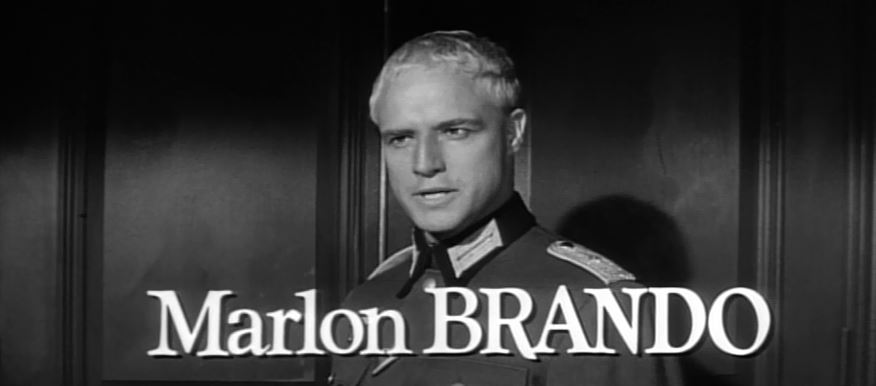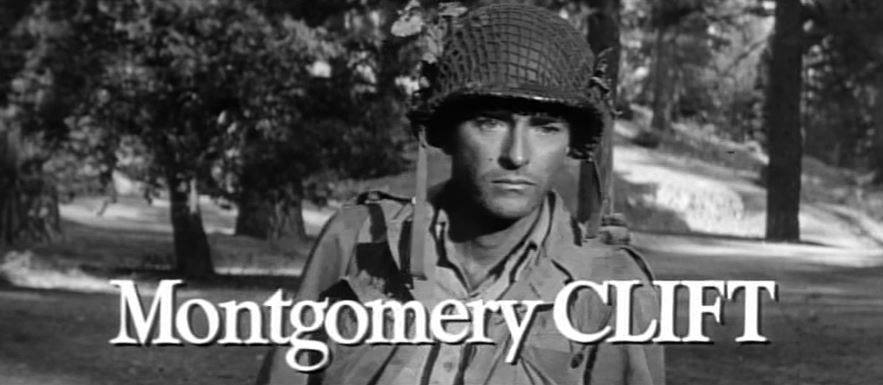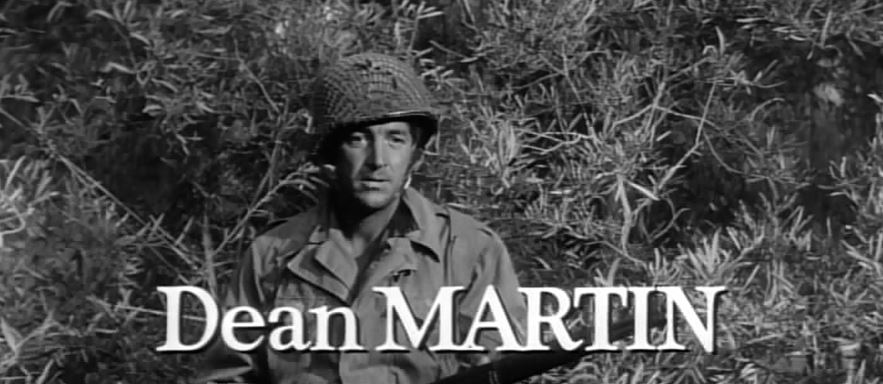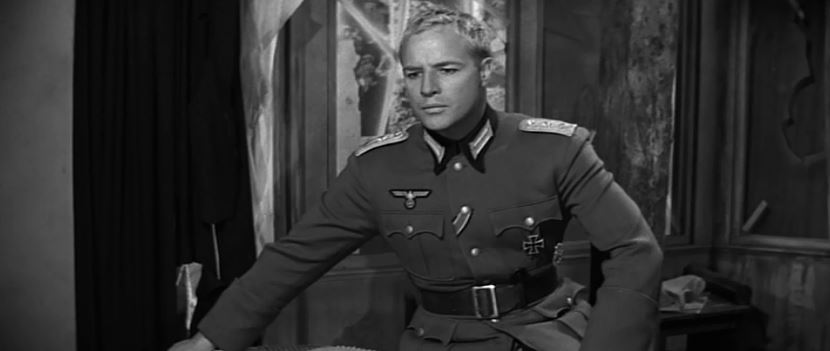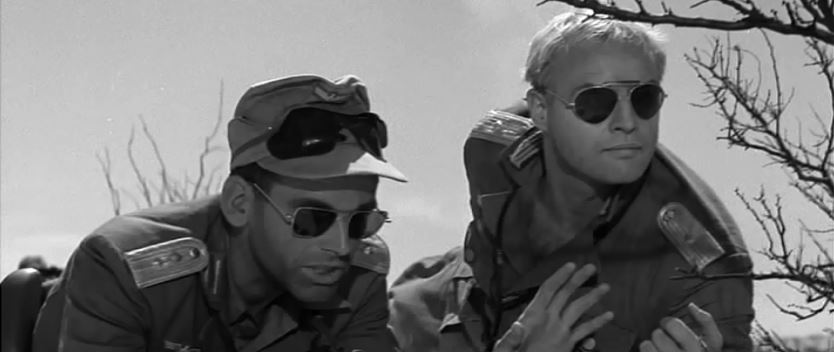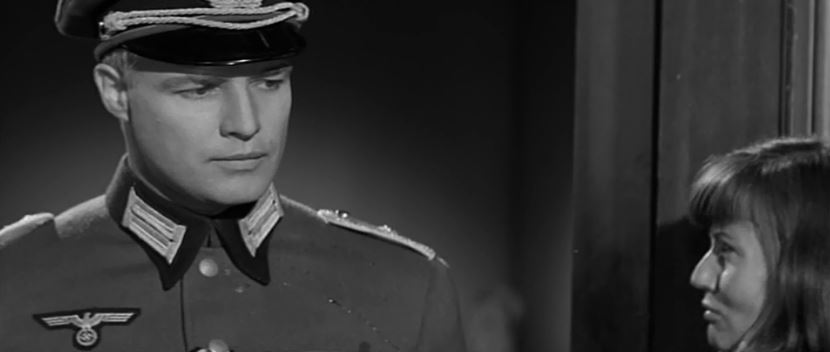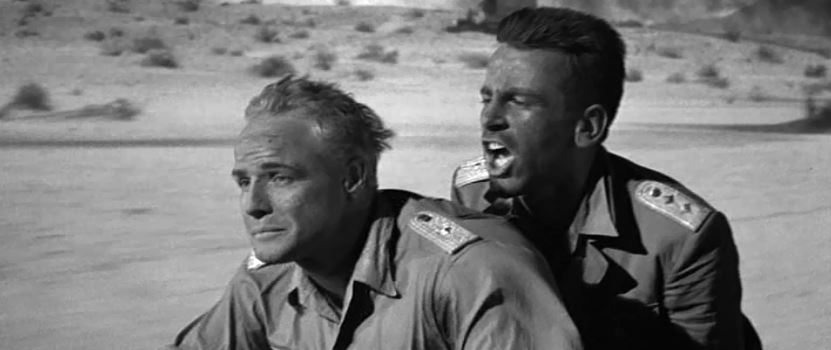Of all the world's World War Two epics which of them can you still stomach? Some of these are endless, like The Longest Day, or Is Paris Burning — others like The Dambusters (1954) rely on reputation to see them through, when in fact they are fairly uninspiring.
The Young Lions however, the ambitious rendering of Irwin Shaw’s novel of the same name, has more to offer than just war, war, war — it has a sympathetic Nazi character played by a bleached blond Marlon Brando, as well as a great turn from the other greatest screen actor in the world at the time — Montgomery Clift — as well as being Dean Martin’s first foray into the world of the serious.
As ever, not only in front of the camera but behind the scenes, Marlon Brando was attempting to control the show, and here he does so in what he believes to be the Ayran guise of the so-called decent Nazi . . . .
So that unlikely trio at the core of The Young Lions certainly needs evaluation — Marlon Brando — Montgomery Clift — and Dean Martin. Sure, Dean Martin is the odd one out here, and thankfully he doesn’t have any scenes with Brando, so we don’t have to watch that almighty horror, but this was Dean Martin’s first film without Jerry Lewis, and a drama to boot, so there was a lot riding on it for him.
Looking back at The Young Lions, Dean Martin doesn’t do that great, but his role was considered successful in its day. It’s hard to see anything appealing in Dean Martin at all, especially as he has so many scenes with Montgomery Clift, who was a tremendously skilled actor, with a unique charisma. It’s true that Dean Martin does represent a certain kind of American male — and does so well — but that is his remaining charm as there is not much else to his role other than his habitual sleaze.
But as it happened, Marlon Brando had a patrilineal ancestor called Johann Wilhelm Brandau, a German immigrant to New York in the early 1700s. I don’t think this qualifies Brando to make a decent stab of playing a German, especially given that he was actually raised as a Christian Scientist. But it’s certain that Brando thought he was on to a good thing — this wasn’t the normal cartoon cut-out Nazi role, something that is still being peddled to this day — but an attempt to show how war affects the human heart, by showing Americans, Europeans and Germans, all as honest men, trying to find their way through the conflict.
The ideal of Brando’s character, and the challenge for the Great Mug himself, was ‘The Good German’. Looked at more closely, Brando doesn’t actually play a Nazi as such in The Young Lions, and nor is his character a member of the SS.
His character, Christian, is supposed to have been a Bavarian cobbler, living in a mountainous ski-resort, and when this film was made, as is still the case today, the norm for presenting a German, is to have the actor talk in English with a faintly ludicrous German accent.
The language problem remains unsolved in Hollywood and although we take it for granted, the end result is usually preposterous, despite the accepted convention.
Such a disjointed film would not be made today without a ladleful of postmodern conceit spooned over it. It is best to conceive of The Young Lions, as three separate films, one film for each character, and despite what billing might suggest, the overall impression is that it is Noah’s story — thus Montgomery Clift’s picture.
Marlon Brando, early on, while skiing with Barbara Rush in Bavaria, gives a pretty eloquent explanation of why someone may follow Hitler, and while we can be critical of this, it is still an honest attempt at an extremely serious question, and all within a few years of the end of the War itself.
What is highlighted in Brando’s character is the fact there were citizens of the Reich who apeared to be clueless about the genocide, and we share in the horror and the denial, while a brave stab is made at actually portraying the concentration camps, not a pleasant task for any director.
Although the material isn’t top drawer, like many roles Brando took, we find in the book of The Young Lions the slow disintegration of a normal decent man into an inhuman killer. Brando argued for a more compassionate portrayal of his character Christian, and although it works well, it does change the outcome of the story. So what Marlon Brando presents is a simple decent man who through the course of the war manages to hold on to his character and humanity and because of that he is destroyed in a different way. This is how Brando’s character is dealt with by the much more traditionally Nazified Maximillian Schell:
“The German army is invincible because it is an army that obeys orders. Any order. No matter how distasteful. It has no sentimentalists, no moralists, no individualists. You will have no future in it if you don't understand that. You may have no future at all if you oppose it. I trouble to tell you this because you have a fine record. You will be a creative soldier, once you get all this thinking knocked out of you.”
It was one of the last acting roles Marlon Brando fulfilled for a long while, as the 1960s were not so kind to him. It’s difficult to say whether the changes made to Marlon Brando’s character make the film harder to enjoy than the book, in which the German character of Christian is not nearly so sympathetic, but Brando made this his own, as he was to do with so many roles, and although some have suggested this was perhaps because he really did believe he could bring more to it by rounding out the badness and showing a more decent man than Irwin Shaw portrayed.
Brando's character Christen Diestl was not a blond stereotype in the book however — he had brown hair and he was not an officer, and like his American counterparts he was an enlisted soldier.
Trailer for THE YOUNG LIONS (1958)

